Intergovernmental relations quarterly report: Quarter 2 2022
Updated 19 December 2023
Reporting period 1 April - 30 June 2022
Reporting on intergovernmental working between the UK Government, Welsh Government, Scottish Government and Northern Ireland Executive.
Overview
Phone calls, emails, meetings held online or in person, between ministers and between civil servants, conducting the routine tasks of government or taking urgent action. In its basic form, this is what ‘intergovernmental relations’ looks like. This is how the UK government and the governments of Wales, Scotland and Northern Ireland work together on a daily basis. What it really is, is so much more. It’s bringing our unique strengths, resources and expertise to the table so we can better tackle common challenges through collective endeavour. It’s a strong partnership which helps us serve and provide for people across the UK.
Across the second quarter of 2022 there were 57 intergovernmental ministerial meetings.[footnote 1]
This quarter, the focus has been on important issues such as:
- supporting the Ukrainian people during the ongoing conflict in their country, mitigating the effects of the war in Ukraine in the UK, and working jointly with the devolved governments on the Homes for Ukraine scheme to enable Ukrainian families to settle in England, Northern Ireland, Scotland and Wales
- alleviating cost of living pressures with help for households across the UK
- continuing our COVID-19 recovery as we move into the next phase of living with the virus.
Outlined in this transparency report is detail of work between the four governments in Quarter 2 to ensure that we are delivering for citizens across the UK.
Quarter 2 in summary (1 April - 30 June 2022)
Cooperation between the four governments was all the more essential during this quarter, as we tackled pressing issues such as addressing the cost of living pressures, our support for the Ukrainian people, the operation of the Northern Ireland Protocol and our continued pandemic recovery.
Set out in this report is an analysis and snapshot of some of the work that took place.[footnote 2]
There were 57 intergovernmental ministerial meetings in Quarter 2.
Although the majority of meetings were held virtually or in a hybrid format, an increasing number are being held in person again (up from 9% to 21% in this quarter). Three meetings were held each in Belfast, Edinburgh, and London, and two meetings in Cardiff. Education ministers from the UK Government and the Scottish Government also took the opportunity to attend and meet at the Organisation for Economic Co-operation and Development (OECD) Teaching Professions Summit in Spain.[footnote 3]
Number of meetings between UK Government (UKG) and Welsh Government (WG), Scottish Government (SG), and the Northern Ireland Executive (NIE) in Quarter 2 of 2022
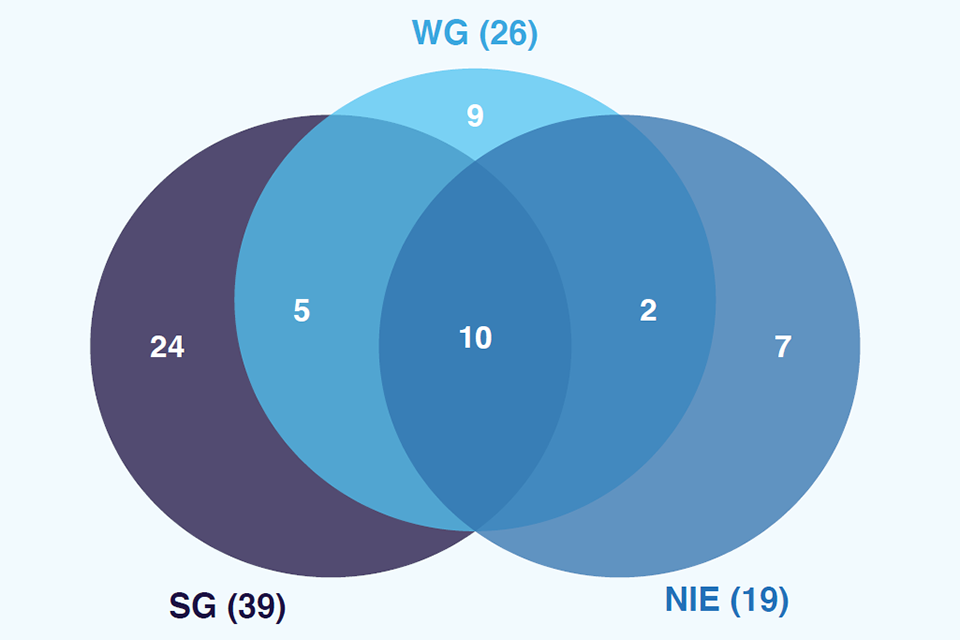
Number of meetings between UK Government (UKG) and Welsh Government (WG), Scottish Government (SG), or Northern Ireland Executive (NIE) in Q2 2022. A total of 57 meetings took place between UKG, WG, SG, and NIE.
Number of ministerial meetings between UK Government departments and the Welsh Government (WG), Scottish Government (SG), or Northern Ireland Executive (NIE) in Quarter 2 of 2022.
Multilateral meetings are counted for each government section. The size of the block reflects the number of meetings.
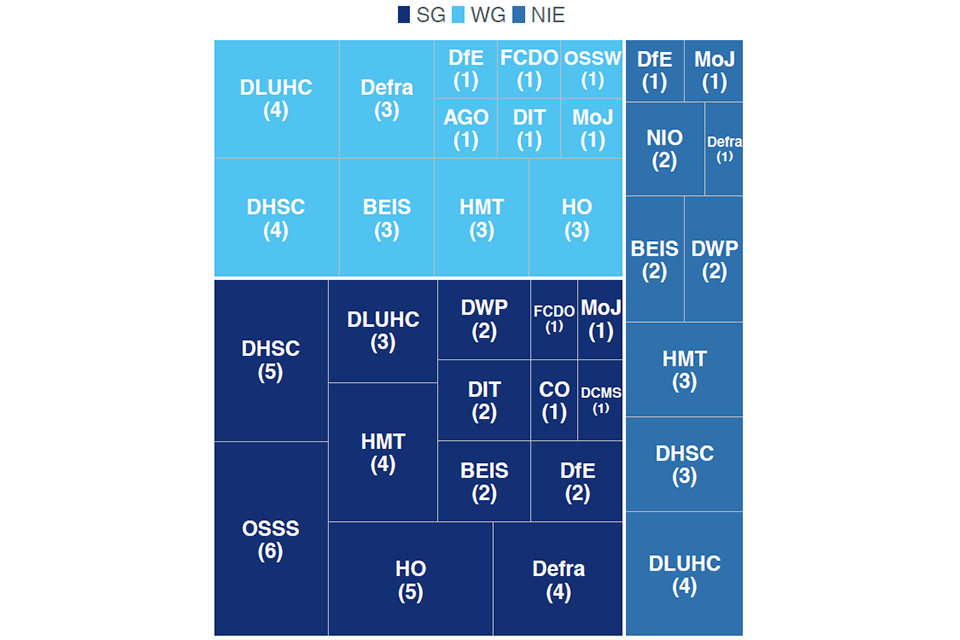
Multilateral meetings are counted for each government section. The size of the block reflects the number of meetings.
Highlights from Quarter 2 - a case study
The UK’s continued support to Ukraine
The Homes for Ukraine scheme launched in March and was co-designed with the devolved governments. It provides a route for adults and families to come to the UK. At the start of the scheme, children or minors under the age of 18 were not eligible unless they were applying with, or planning to reunite with, a parent or legal guardian in the UK. This was due to a number of reasons over safeguarding concerns, and advice from the Ukrainian Government itself. As the scheme matured and the conflict continued, we saw an increased demand for some unaccompanied minors to be sponsored and granted visas.
It was paramount for the UK Government and the devolved governments that the needs of unaccompanied children were accounted for, and that safeguarding was at the heart of policy development. In order to progress a policy response, extensive engagement was conducted at ministerial level and between civil servants across all four governments. Through this an extension to the Homes for Ukraine scheme was developed UK-wide. It will ensure a fair and consistent approach to safeguarding so that children fleeing the conflict are protected and
receive the same warm welcome and support, wherever they settle in the UK. The UK Government was able to present this joint UK-wide position to the Ukrainian government for approval.
On 22 June it was announced that the Homes for Ukraine scheme will allow eligible children and minors under the age of 18, who have already applied for a visa and who are not travelling with or joining a parent or legal guardian, to come to the UK in a carefully defined and jointly agreed set of circumstances. To provide the best security to these children, sponsors will be asked to commit to hosting
the child for up to three years, or until they are aged 18 so long as the placement has lasted for a minimum of six months. In line with existing agreements for tailored funding across the UK, we also agreed to continue thank you payments to sponsors for the full three years of the visa. These will be paid directly to local authority equivalents across England, Scotland and Wales, and to the Northern Ireland Executive. Additional funding for year one to cover education and, where required, care services will also be provided UK-wide.
Home Office ministers have continued to engage with devolved government counterparts on the war in Ukraine and UK-wide support. The Minister for Refugees Lord Richard Harrington as well as the Minister for Safe and Legal Migration Kevin Foster MP have both regularly engaged with the devolved governments on the Homes for Ukraine scheme.
Thanks to the close collaboration between all four governments, we welcomed over 58,000 Ukrainian guests to the UK by the end of the quarter and we look forward to ongoing collaborative and open working with the devolved governments as the extension launches.
Activity during Quarter 2
There was considerable engagement between the UK Government and the devolved governments during the second quarter of the year, enabling us to take joint action for the benefit of our nations’ citizens.
Detailed below are some of the areas in which collaboration between the governments took place.
Cost of living
Households across the UK are struggling to make their incomes stretch to cover the rising cost of living. In response, on 26 May, the then Chancellor of the Exchequer, Rt Hon Rishi Sunak MP, announced a £15 billion package of support, on top of the £22 billion already announced.
Following this announcement, the Chief Secretary to the Treasury, Rt Hon Simon Clarke MP held bilateral calls with the Scottish Government Cabinet Secretary for Finance and the Economy Kate Forbes MSP and Northern Ireland Executive Minister of Finance Conor Murphy MLA respectively. The Chief Secretary to the
Treasury gave an overview of the package and fielded questions from the devolved government ministers.
The UK Government Minister for Disabled People, Chloe Smith MP, had phone calls with the Scottish Government Minister for Social Security and Local Government, Ben Macpherson MSP, and the Northern Ireland Executive Minister for Communities, Deirdre Hargey MLA, to discuss the delivery of the social security elements of the package in Scotland and Northern Ireland respectively, as well as regular official level engagement taking place between the UK Government and the devolved administrations.
The Interministerial Standing Committee (IMSC) met for the second time on 29 June and it was chaired by the Scottish Government’s Deputy First Minister, John Swinney MSP. The IMSC is attended by ministers from across the UK with responsibility for intergovernmental relations. The committee discussed the rise in the cost of living, including the measures recently announced by the UK Government, and common challenges faced across the UK and devolved governments. Ministers also discussed the current UK Parliament legislative programme and followed up and progressed the discussion on approaches to UK legislation and ways of working, highlighting the importance of early engagement.
Health and COVID-19 recovery
Last quarter, the former Secretary of State for Health and Social Care, Rt Hon Sajid Javid MP, worked regularly with the health ministers in the devolved governments to secure the continued recovery of our health and social care systems following the pandemic as we all move into the next phase of living with the virus.
At a First Ministers’ Call in mid-June the former Secretary of State for Levelling Up, Housing and Communities, Rt Hon Michael Gove MP, welcomed the Minister for Vaccines and Public Health, Maggie Throup MP and Dr. Jenny Harries to present the UK Government’s approach to future waves of COVID-19 cases. The update covered vaccination programmes, aligned communications approaches, and domestic surveillance and testing. Engagement with the devolved governments continues at the regular programme board, with the UK Health Security Agency
response teams, and in the assessment of contingency plans. The Chief Medical Officers from all parts of the UK also meet regularly. Other regular UK-wide forums between civil servants have also covered key aspects of EU and trade policy, social care reform, and supply of medicines and medical goods.
Throughout the early stages of the pandemic, a UK-wide approach on the procurement of therapeutics was vital to allow all parts of the UK to benefit from the needed buying power to secure significant numbers of therapeutics in a competitive global market. This is continuing in our response to Monkeypox, where we have secured vaccines and antivirals which will be made available for use by the devolved administrations, Crown Dependencies and Overseas Territories as required.
Former Secretary of State for Health and Social Care, Rt Hon Sajid Javid MP met with his counterparts in Northern Ireland and Wales to discuss opportunities for collaboration with the Health Disparity and Inequalities work.
The Minister for Vaccines and Public Health, Maggie Throup MP, met with the devolved governments to discuss the independent Khan Review, which looks at the UK Government’s ambition to make England smoking-free by 2030. The then-Minister for Patient Safety and Primary Care, Maria Caulfield MP and Humza Yousaf MSP met to discuss medicinal cannabis policy and explore how we can work collaboratively across the UK to improve the evidence base and conduct clinical trials in this area.
Ministers from the UK Government, Welsh Government and Scottish Government attended a roundtable on antimicrobial resistance (AMR). This roundtable discussed the current risks of AMR, innovation, supply and access post-COVID-19, the role of free trade agreements and international cooperation to tackle AMR and the importance of working collectively to address the issue.
The former Minister of State for Crime and Policing, Rt Hon Kit Malthouse MP, and Angela Constance MSP, Minister for Drugs Policy in the Scottish Government, met at the National Drug Summit in May and further engaged in a focused bilateral meeting to discuss the issues surrounding drugs. Angela Constance MSP highlighted that the Scottish Government is continuing to explore the trial of Drug Consumption Rooms, with them pursuing their own powers in this space.
Minister Constance said to expect three licence applications from Scotland for drugs checking facilities in Glasgow, Aberdeen and Dundee. Both ministers also discussed pill press regulation, with Minister Malthouse confirming he was considering legislative options that could be used for this.
Agriculture and the environment
At the May meeting of the Interministerial Group for Environment, Food and Rural Affairs, the UK Government discussed the future legislative programme. DEFRA provided updates on the Genetic Technology (Precision Breeding) Bill, the Animal Welfare (Kept Animals) Bill and the Brexit Freedoms Bill. The Secretary of State for Environment, Food and Rural Affairs, Rt Hon George Eustice MP highlighted how this legislation once in place would provide opportunities to support greater economic growth within the UK, enhance animal welfare and maintain standards following the UK’s exit from the EU.
The group also discussed the Scottish Government’s Future Agriculture Policy proposals for sustainable and regenerative farming. This outlined how the Scottish Government - represented by Lorna Slater MSP, Minister for Green Skills, Circular Economy, and Biodiversity and Mairi McAllan MSP, Minister for Environment and Land Reform - proposes to ensure Scotland remains a global leader in sustainable and regenerative farming.
Education and skills
The former Secretary of State for Education, Rt Hon Nadhim Zahawi MP, attended the second UK Education Ministers Council - the Education Interministerial Group, chaired by the Scottish Government Cabinet Secretary for Education & Skills, Shirley-Anne Somerville MSP in Edinburgh in June. Ministers discussed lifelong learning, green skills, student finance, qualifications and examinations in 2022.
In June, Minister for State for Northern Ireland, Rt Hon Conor Burns MP, alongside Northern Ireland Executive Minister for the Economy, Gordon Lyons MLA, jointly launched the second year of the hugely successful ‘Skill Up’ initiative. The programme is supported by an investment of up to £23 million from the Department for the Economy and the Northern Ireland Office. It is fully funding local further and higher education providers to deliver more than 20,000 training places.
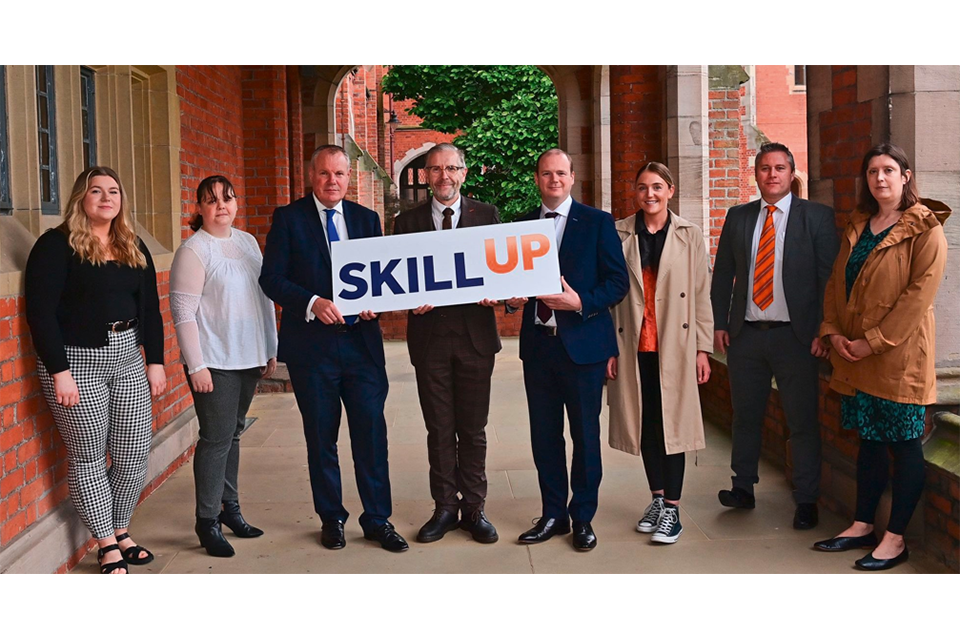
Pictured at Queen’s University Belfast are the Minister of State for Northern Ireland, Rt Hon Conor Burns MP; students Victoria Welsh and Laura Neill; and Northern Ireland Executive, Economy Minister Gordon Lyons MLA at the launch of the Skill Up programme, now in its second year.
Business, industry, and jobs
The Business and Industry Interministerial Group met in May and was chaired by the Scottish Government Minister for Business, Trade, Tourism and Enterprise, Ivan McKee MSP. The UK Government was represented by the former Minister for Industry, Lee Rowley MP, with Northern Ireland’s Minister for the Economy, Gordon Lyons MLA, and the Welsh Government Minister for the Economy, Vaughan Gething MS, also in attendance. The Scottish Government presented their National Strategy for Economic Transformation, which sets out how they aim to deliver economic growth over the next ten years. This followed a similar presentation by the Welsh Government at the group’s previous meeting, reflecting the cross-UK approach to focus on pandemic recovery and rebooting the economy. The meeting also covered labour market shortages, as well as the most pertinent challenges facing each nation’s respective economy.
Also in May, the Interministerial Group for Environment, Food and Rural Affairs met to discuss ongoing sector issues arising from the conflict in Ukraine. The unprecedented rise in input costs, particularly for feed, fuel and fertilisers and the resulting impact on all sectors within the agri-food industry was highlighted, with a range of industry support options considered. There were also concerns raised about developing countries which are reliant on Ukrainian grain, with ministers seeking further information on what is being done by the UK at an international level to ensure wider food security.
The Secretary of State for Business, Energy and Industrial Strategy, Rt Hon Kwasi Kwarteng MP, and the then Secretary of State for Wales, Rt Hon Simon Hart MP, both held bilateral meetings with the Welsh Government Minister for Economy, Vaughan Gething MS, to discuss how best to support the steel sector in Wales.
The Parliamentary Under-Secretary of State for Scotland, Lord Offord of Garvel, chaired the Scottish Seafood Industry Action Group on 30 June, which was attended by the Scottish Cabinet Secretary for Rural Economy and Tourism, Mairi Gougeon MSP. The group discussed a range of issues including the impact of conflict in Ukraine, the Scottish Government’s Food Security and Supply paper, access to labour, the Migration Advisory Committee, future opportunities for the sector including two papers by Salmon Scotland and the Scottish Fishermen’s Federation, and updates on digitisation, white fish sanctions and tariffs, import controls and the impact of the Northern Ireland Protocol proposals.
Chloe Smith MP, the Minister for Disabled People, attended the Harkin International Disability Employment Summit in Belfast, where she met with Communities Minister, Deirdre Hargey MLA, to discuss and share best practice on employment support for disabled people.
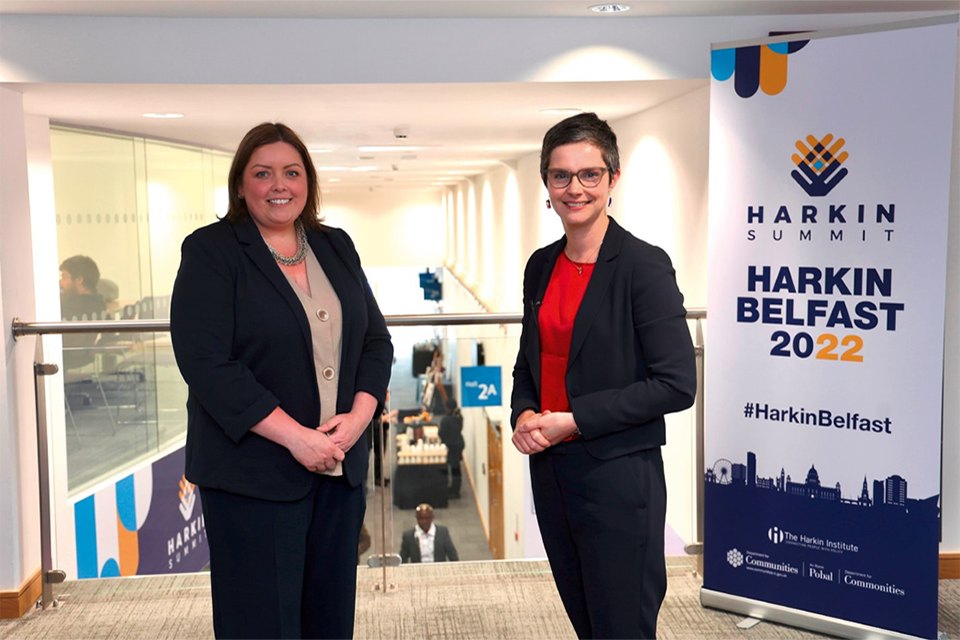
The Minister for Disabled People, Chloe Smith MP and the Minister for Communities of Northern Ireland, Deirdre Hargey MLA at the Harkin International Disability Employment Summit in Belfast.
Ministers from the Department for Work and Pensions, the Scotland Office and the Scottish Government attended the Joint Ministerial Working Group on Welfare on 16 May. This is part of ongoing work to oversee the implementation of social security powers devolved to the Scottish Government under the Scotland Act 2016.
In June, the Parliamentary Under-Secretary of State for Scotland, Iain Stewart MP, met twice with the Scottish Government Minister for Business, Trade, Tourism and Enterprise, Ivan McKee MSP, to discuss the delivery of the city and regional growth deal programme, which has invested £1.5 billion in regions across Scotland.
These ministerial discussions helped to progress investment opportunities for the Prestwick Commercial Space project in the Ayrshire Growth Deal. The minister also attended the Scottish Business Growth Group on 21 April, as co-chair of the meeting, with the Scottish Government Cabinet Secretary for Finance and the Economy, Kate Forbes MSP, alongside key business representative organisations in Scotland to discuss the challenges faced by businesses in Scotland, the National Strategy for Economic Transformation and the UK Government’s Levelling Up agenda.
Finance and investment
The second meeting of the Finance: Interministerial Standing Committee was held on 15 June in Cardiff. This was the first meeting chaired by the Welsh Government as part of new intergovernmental relations rotational arrangements. It was chaired by Rebecca Evans MS, Welsh Government Minister for Finance and Local Government, and attended in person by the Chief Secretary to the Treasury, Rt Hon Simon Clarke MP, Northern Ireland Executive Minister of Finance, Conor Murphy MLA, and Scottish Government Cabinet Secretary for Finance and the Economy, Kate Forbes MSP.
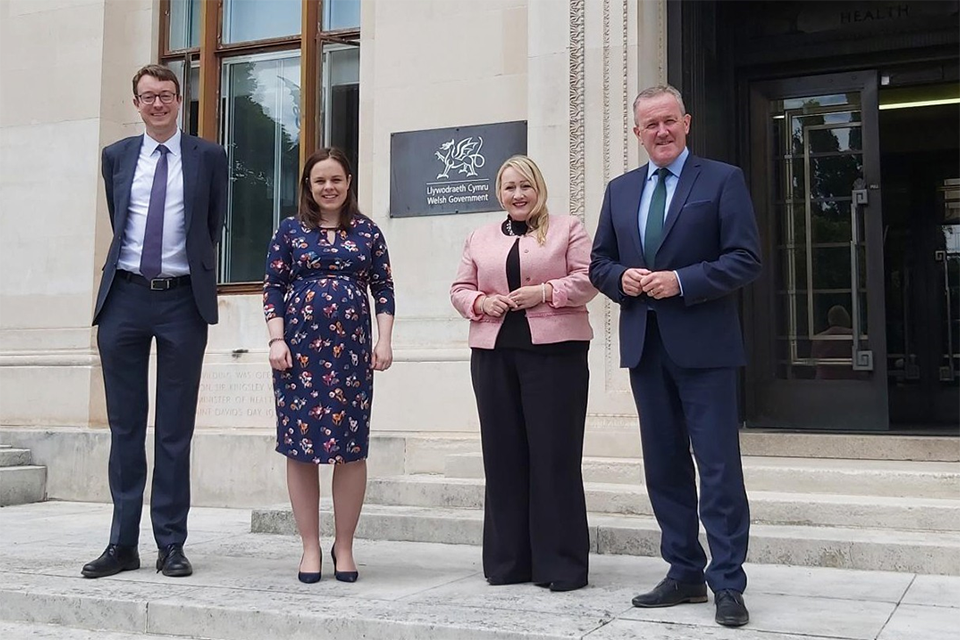
Chief Secretary to the Treasury, Rt Hon Simon Clarke MP, Scottish Government Cabinet Secretary for Finance and the Economy Kate Forbes MSP, Welsh Government Minister for Finance and Local Government Rebecca Evans MS, and Northern Ireland Executive Minister of Finance Conor Murphy MLA. Pictured after the Finance Interministerial Standing Committee meeting held in Cardiff.
Ministers discussed the latest economic outlook and the actions being taken by the UK Government and devolved administrations to address cost of living pressures across the UK, net zero and the British Energy Security Strategy, EU replacement funding, COVID-19 recovery, the upcoming UK Infrastructure Bank Bill, and Freeports.
Freeports in Scotland and Wales
In partnership, the Scottish Government and the UK Government are coordinating a joint assessment process of the five Green Freeport bids. This assessment considers four joint key policy objectives covering regeneration and high-quality job creation, decarbonisation and just transition to a net zero economy, establishing hubs for global trade and investment and fostering an innovative environment.
The UK and Welsh Governments have reached a landmark agreement to collaborate on the joint delivery of at least one new Freeport in Wales. Freeports will support the regeneration of communities in Wales by attracting new businesses, jobs and investment, as well as growing the Welsh economy.
Good progress has been made on the Freeport Programme in Wales bidding prospectus. In addition, the Welsh Government and the UK Government hosted a joint Welsh Freeport stakeholder engagement event to explain the Welsh Freeport model. The intention is to jointly publish the prospectus over the summer.
Delivering cultural programmes across the UK
In May, the Minister for Arts, Lord Parkinson of Whitley Bay, visited Wrexham, one of four shortlisted places in the 2025 UK City of Culture competition. The minister met the bidding team and partners to congratulate them on reaching the shortlist and to reiterate support for the UK City of Culture programme as a means of bringing partners together, raising the profile of a place, fostering local pride, increasing investment and levelling up opportunity across the UK. For the first time in the history of the UK City of Culture competition, each of the runners up (including Wrexham, as well as Southampton and County Durham) will receive a grant of £125,000 to support the bidding teams in taking forward some of the most exciting elements of the bids.
Lord Parkinson of Whitley Bay continues to meet with partners of the Edinburgh International Culture Summit as preparations ramp up for August. The most recent strategic board meeting took place on 18 May. The strategic board comprises Lord Parkinson of Whitley Bay, Scottish Government Cabinet Secretary for Constitution, External Affairs and Culture, Angus Robertson MSP, Presiding Officer of the Scottish Parliament, Alison Johnstone MSP, and representatives from the British Council and Edinburgh International Festival.
International issues
The former Minister for Europe and North America, Rt Hon James Cleverly MP, spoke with both Scottish Government Minister for Culture, Europe and International Development, Neil Gray MSP, and Welsh Minister for Economy, Vaughan Gething MS, to set out the UK Government’s position on the Northern Ireland Protocol ahead of the Foreign Secretary’s statement to Parliament.
The Foreign Secretary also wrote to Scottish and Welsh Government ministers, and the Permanent Secretary of the Northern Ireland Executive, ahead of the Bill’s introduction and First Reading.
Alongside this ministerial engagement, the Foreign, Commonwealth and Development Office (FCDO) continues to engage with the devolved governments at senior civil servant level. FCDO ambassadorial staff continue to represent all parts of the UK through our overseas network, and brief ministers from the devolved governments during their visits overseas. During this period, these included visits by the Welsh Government First Minister, Rt Hon Mark Drakeford MS to Oslo, and Scottish Government ministerial visits to the United States of America, Poland, Denmark and Norway. Minister for Africa, Latin America and the Caribbean, Vicky Ford MP, jointly hosted a reception for the Scottish Council for Global Affairs at Lancaster House in June, with the Secretary of State for Scotland, Rt Hon Alister Jack MP, and attended by embassy representatives, academics, and Scottish Government civil servants.
The Department for International Trade’s (DIT) Constitutional Affairs, Legislative and Procurement teams have met on several occasions with the devolved administrations to discuss the Trade (Australia and New Zealand) Bill. Bill clauses require DIT to seek legislative consent from all three devolved administrations.
Meetings to date have focused on consent mechanisms and addressing their concern with the use of concurrent powers.
Cooperation and security
The Bill of Rights represents a major priority for the Ministry of Justice and there has been ministerial engagement throughout the consultation period and in advance of the Bill’s introduction. Since being appointed Parliamentary
Under-Secretary of State, Lord Bellamy QC, has called ministers in the Scottish Government Cabinet Secretary for Justice Keith Brown MSP, Welsh Government Counsel General and Minister for the Constitution Mick Antoniw MS and Northern Ireland Executive Minister of Justice Naomi Long MLA to introduce himself and discuss shared issues and priorities. Engagement will increase in frequency across a range of issues, with the Bill of Rights likely to remain a focus as it continues its passage through Parliament.
The Minister for Safe and Legal Migration, Kevin Foster MP, led a meeting attended by Jane Hutt MS and Shona Robison MSP to announce plans for a move to full asylum dispersal which will involve all councils in the UK. Ministers discussed plans for consultation and the funding package. They spoke to the need for better joined-up working between the Home Office, devolved governments and local authorities on this issue. It was highlighted as a priority by all governments in attendance, for the need to move people out of hotels and into local accommodation. There were particular challenges around the provision of legal services in smaller and more rural council areas. Minister Foster explained the consultation will work with local authorities to address these concerns.
Common Frameworks programme delivery
Common Frameworks are agreed ways of working between the UK Government and the devolved governments to support management of powers returned from the EU across the UK. The UK Government’s aim is to enable regulatory divergence to occur in a managed way which works for the UK as a whole.
We are pleased to report that for the Nutrition Labelling, Composition and Standards Framework, all relevant ministers in Scotland, Wales, Northern Ireland and the UK Government have agreed the final version.
Under the process for considering UK Internal Market (UKIM) Act exclusions in Common Framework areas, an exclusion was agreed regarding certain single use plastics, such as straws, cutlery and polystyrene containers, enabling the devolved governments to legislate against their sale.
The UK Government continues to use every opportunity to embed the use of Common Frameworks. In many areas, Common Framework meetings are already taking place regularly, such as for the Public Procurement Common Framework, whose meetings cover such topical items as the Procurement Bill that is currently progressing through Parliament and which has, with the agreement of their governments, been extended to cover both Wales and Northern Ireland.
Glossary of abbreviations for UK government departments
AGO Attorney General’s Office
BEIS Department for Business, Energy and Industrial Strategy
CO Cabinet Office
DCMS Department for Digital, Culture, Media and Sport
DEFRA Department for Environment, Food and Rural Affairs
DfE Department for Education
DfT Department for Transport
DHSC Department of Health and Social Care
DIT Department for International Trade
DLUHC Department for Levelling Up, Housing and Communities
DWP Department for Work and Pensions
FCDO Foreign, Commonwealth and Development Office
HMT Her Majesty’s Treasury
HO Home Office
MoD Ministry of Defence
MoJ Ministry of Justice
NIO Northern Ireland Office
OSSS Office of the Secretary of State for Scotland
OSSW Office of the Secretary of State for Wales
-
To note, the Northern Ireland Executive is not in place and, as such, senior civil servants attended when ministerial representation was not possible. ↩
-
The data was collected through a proforma completed by departments. The analysis was quality assured by an independent analyst. ↩
-
The location was due to the OECD’s International Summit on the Teaching Profession taking place in Spain. ↩
